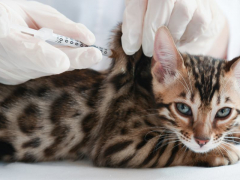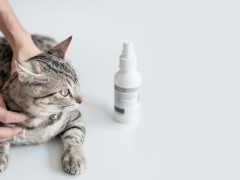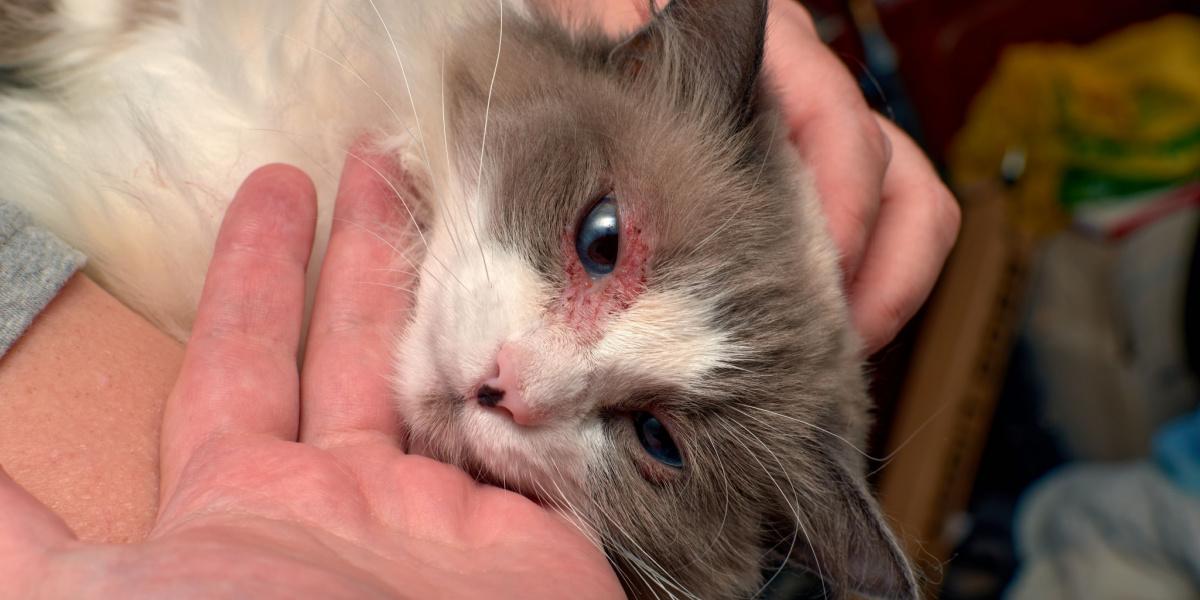
Depo-Medrol for cats is a long-acting steroid injection. It is used for inflammatory, immune-mediated, or allergy-type conditions. In this article, you’ll learn what Depo-Medrol is, when it may be used, the side effects to monitor for, and some frequently asked questions.
Quick Overview: Depo-Medrol for Cats

About Depo-Medrol for Cats
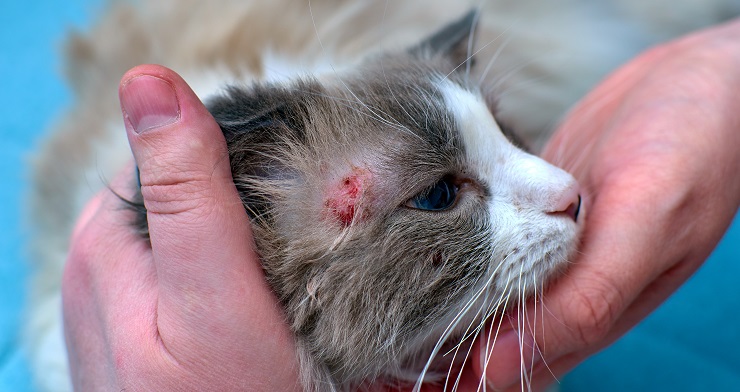
Depo-medrol for cats is injected rather than given orally, making it long-lasting and easier to administer.
Depo-Medrol is a brand name for the injectable steroid drug methylprednisolone acetate. It is manufactured by Zoetis Animal Health.
There are a couple of different kinds of steroids. Steroid hormones, like progesterone and testosterone, act as signal messengers in the body. Anabolic steroids, such as those used by professional bodybuilders, are those that act to increase muscle and bone growth.
Corticosteroids are a third class of steroids. Corticosteroids are involved in a variety of mechanisms within the body, including stress response, immune response, regulation of inflammation, and others.
When we use corticosteroids, it is typically for anti-inflammatory activity to help reduce swelling and inflammation in the body. At higher doses, it suppresses the immune system, which can be a good or bad thing, depending on the disease being treated.
While similar to other glucocorticoid steroids like prednisone or hydrocortisone, methylprednisolone is far more potent. It is 4-5 times more potent than hydrocortisone.
Methylprednisolone comes in oral tablets and a couple of injectable forms, but the brand Depo-Medrol only refers to a long-acting injectable form of the drug.
What Does Depo-Medrol Do for Cats?
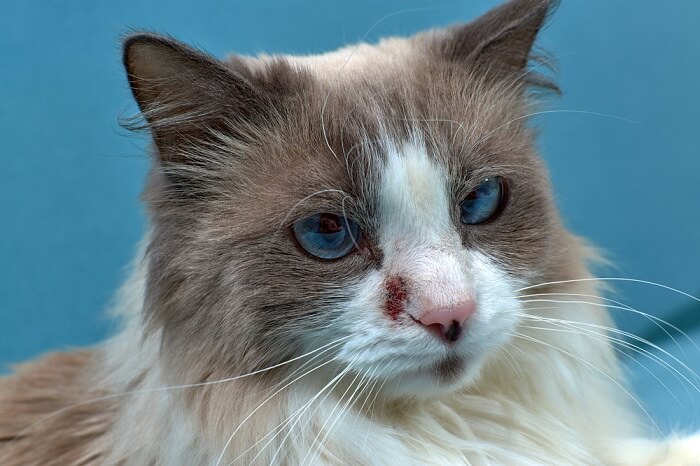
Depo-Medrol is ideal for cats that don’t respond well to taking medication orally.
Depo-Medrol is used in the same types of situations where an oral steroid like prednisolone may be used.
This most often includes inflammatory conditions, immune-mediated conditions where the immune system is overreacting to a stimulus and causing harm to the body, and in the case of allergic conditions.
Specifically, this may include inflammation secondary to a wound or infection, an immune-mediated condition such as those that cause blood disorders like low red blood cells or platelets. It also includes inflammatory allergy conditions like atopic dermatitis, inflammatory bowel disease (IBD), or feline asthma. It is also used for certain types of cancer that respond to corticosteroid therapy, such as lymphoma.
In a majority of cases, the preference for the type of steroid will be oral. Oral prednisolone in cats can be dosed very closely. Doses can be adjusted in the case of unwanted side effects or when the dose may need to be increased to be effective.
Cats are fairly infamous for rejecting oral medication. They often spit them out or drool excessively afterward. Because cats don’t like being given medicine orally, cat owners risk getting bitten or scratched when attempting to do this at home.
It is mostly in these situations that veterinarians reach for Depo-Medrol. Depo-Medrol for cats is injected, and a dose lasts for weeks or months.
However, while this may seem very convenient, methylprednisolone acetate’s potency and long duration of effect also carry the risk of more significant side effects. Because of this, it is often a last choice for many vets when looking to treat a cat with steroids
Side Effects of Depo-Medrol for Cats
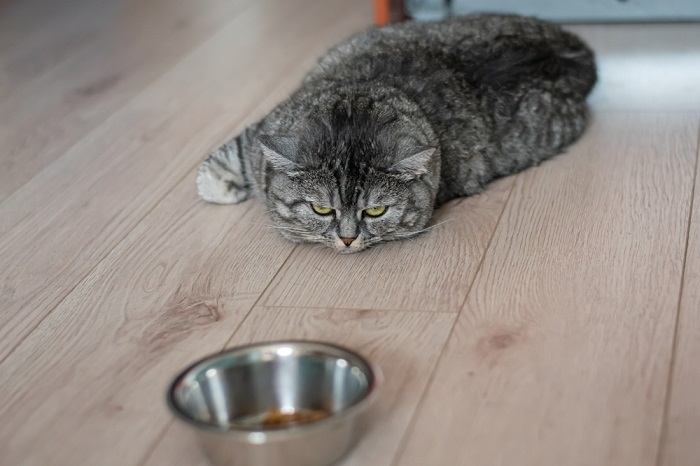
Side effects of Depo-Medrol can occur in cats, but they are often milder than they are in dogs.
Generally speaking, when compared to dogs, cats require higher doses of a steroid to accomplish the same effects. Still, noticeable side effects are much less apparent in cats.
The exception is when steroids are used for a longer period of time. Because Depo-Medrol is always a more potent and longer-acting medication compared to prednisolone, side effects are more noticeable, more concerning, and require more careful monitoring.
The side effects of any steroid include increased thirst, urination, and appetite. There are also digestive upset signs, with diarrhea being the most common in cats with the potential for vomiting or decreased appetite. While more commonly seen in dogs, ulcers of the stomach and upper digestive tract can also be a potential risk.
These are less appreciated in cats, especially in the short term. If these side effects show up, they generally resolve when the steroid is discontinued with some additional supportive care sometimes needed.
However, with a Depo-Medrol injection, the slow absorption can lead to effects that may last for weeks to months and can be different for each cat. So even with just a single Depo-Medrol injection, we have to consider the long-term use effects of steroids to look out for.
Other Risks and Considerations

Depo-Medrol is not appropriate for all cats. A veterinarian will help you decide if it is right for your cat.
A potent long-acting steroid must be used cautiously with any active bacterial or viral infections, especially severe infections. Oral steroids are often given alongside antibiotics for certain types of infections. With Depo-Medrol being more potent and its full duration in a feline patient not fully predictable, this could affect the immune system’s ability to fight infection.
The biggest risks for cats using Depo-Medrol are the development of diabetes mellitus and congestive heart failure.
The use of corticosteroids in the body can lead to a degree of resistance to insulin, the hormone that is needed to transport blood sugar from the bloodstream and into cells. This rarely has consequences over the short term, but long term, this resistance can lead to the full development of diabetes.
Cats who are overweight or obese and already at a higher risk of developing diabetes, are at the highest risk of crossing this threshold if a Depo-Medrol injection is used. Long-acting steroid use can also lead to weight gain.
Long-acting steroid use can lead a cat with heart disease to heart failure. This happens when fluid begins to build up in or around the lungs and sometimes also around the heart itself, as well as the abdomen.
These two significant risks of Depo-Medrol use have led many veterinarians to screen cats for risk prior to starting Depo-Medrol as a primary treatment choice. This includes checking blood sugar and the heart itself for abnormalities. This is done using a blood test, x-rays, or an ultrasound of the heart.
Depo-Medrol use should be avoided in pregnant cats and used cautiously for lactating animals.
Interactions With Other Medications and Overdoses
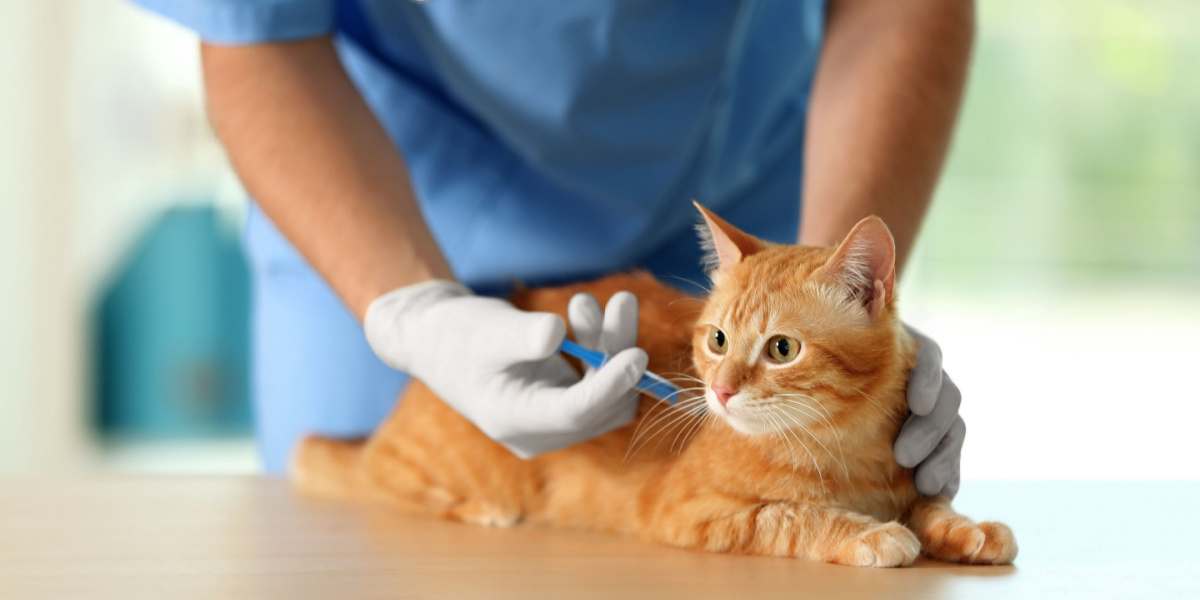
Steroids commonly interact with other drugs and need to be used carefully.
There are many medications that interact with steroid use, especially long-acting steroids. Common ones include other immunosuppressant drugs like cyclosporine, non-steroidal anti-inflammatory medications (such as meloxicam or robenacoxib), and certain diuretic drugs like furosemide.
While the use of Depo-Medrol is avoided in diabetic cats, its use will often lead to increased insulin requirements to manage the condition.
If steroids are being used for immunosuppression, vaccination should be carefully considered, This is especially true for live-attenuated viral vaccines, because the immune system may not respond properly. The vaccine(s) for panleukopenia virus, herpesvirus, calicivirus, and Chlamydia may be modified live while vaccines for rabies and feline leukemia virus (FeLV) are not.
Because Depo-Medrol is given intramuscularly with a needle and syringe, some transient pain may be present at your kitty’s injection site. Make sure to contact your vet if noticeable soreness lasts for more than 24 hours.
Overdoses with Depo-Medrol are uncommon since this medication is always administered by a licensed veterinarian in accordance with guidelines and not given at home. However, even with an acceptable dose, side effects are possible.
If you are ever concerned that your kitty may have developed side effects or toxicity after receiving Depo-Medrol, make sure to contact your veterinarian, the ASPCA Animal Poison Control Center (1-888-426-4435), or Pet Poison Helpline (1-855-764-7661) immediately for further advice.
Depo-Medrol for Cats Dosage
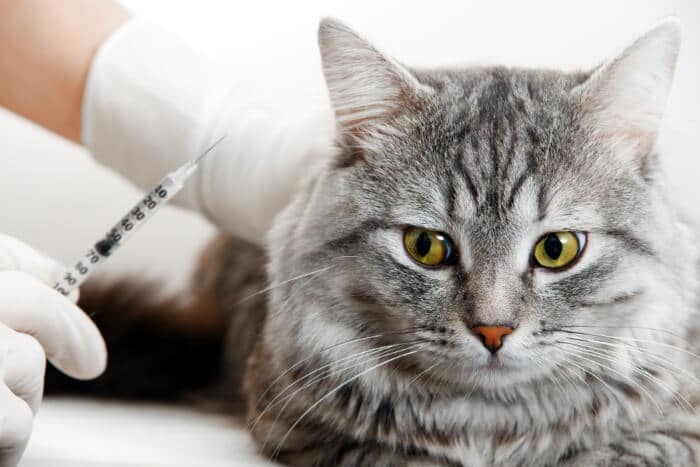
The dosage of Depo-Medrol varies depending on your cat’s needs.
Depo-Medrol is FDA-approved for intramuscular injection use in cats.
The usual intramuscular (IM) dose range for Depo-Medrol for cats is between 10 mg and 20 mg per cat. The dosage used will depend on the condition being treated. There are different concentrations of Depo-Medrol available, so the volume of the injection in milliliters (ml) may differ depending on what concentration your vet carries.
The goal of any steroid therapy is to use the lowest effective dose and the longest intervals between doses that still control signs of disease. It is common for Depo-Medrol injections to be given every 4-6 weeks for chronic conditions, or sooner if signs of disease return.
Final Thoughts

Long-term use of Depo-Medrol in cats carries certain risks, which need to be monitored closely.
Depo-Medrol for cats is a potent long-acting steroid. It is used for very similar purposes as other steroids like prednisolone, but because of its potency and duration and risk for long-term side effects, is often restricted to use in cases where a cat cannot be administered an oral medication practically or safely. Any cat parent whose kitty is receiving a Depo-Medrol injection should be aware of the possible risks and alternatives to its use, if any.
Drug Dosing Disclaimer: We are only able to provide doses for medications that are FDA approved for use in cats and only as the label guidelines dictate. For medications that are used off-label we can only provide guidelines and safety information for use. Safe and appropriate dosing for off-label medications can only be determined by a primary care veterinarian.
We encourage you to work with your veterinarian to determine if a particular medication is appropriate for your cat. Changing or adjusting a dose for your cat on your own without consulting with a veterinarian can carry risk. We do not encourage use of medications prescribed for human use in pets without first consulting with a primary care veterinarian.
Also Read: 10 Subtle Signs Your Cat May Be Sick
